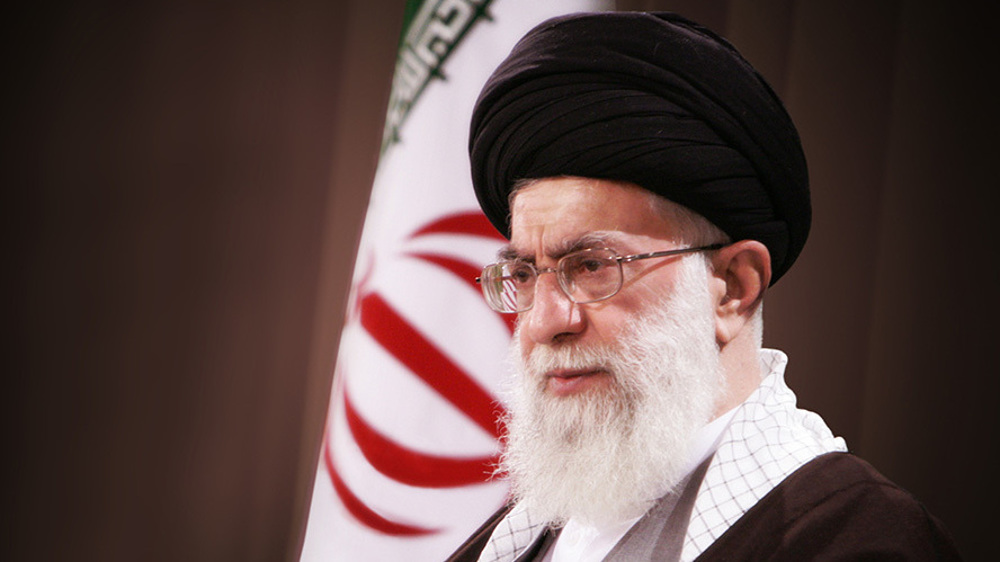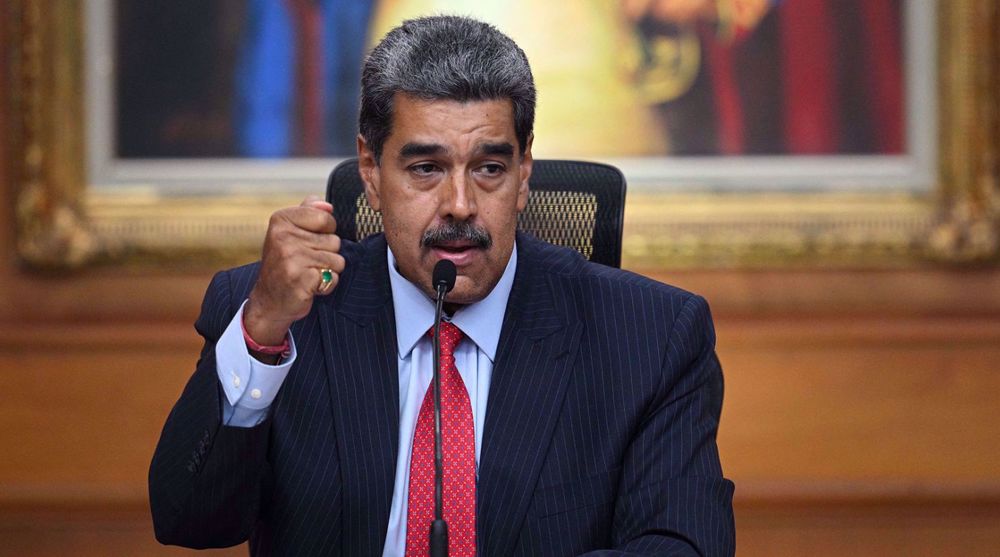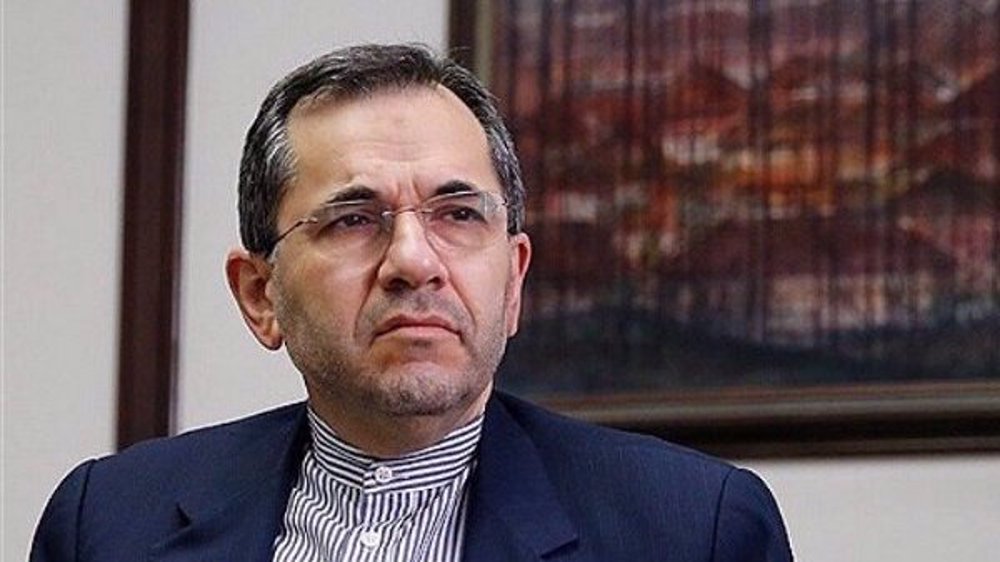Iran, France presidents discuss nuclear deal, Syria's Ghouta by phone
Iranian President Hassan Rouhani and his French counterpart, Emmanuel Macron, have discussed the latest developments regarding Iran's nuclear deal with the P5+1 group of countries and the current situation in Syria's Eastern Ghouta.
The two presidents held a phone conversation on Sunday on the eve of French Foreign Minister Jean-Yves Le Drian's scheduled visit to Tehran.
According to Iranian Foreign Ministry Spokesman Bahram Qassemi, the French foreign minister is to arrive in Tehran Sunday night to hold talks with senior Iranian officials.
During his two-day visit, Le Drian plans to exchange views with President Rouhani and Foreign Minister Mohammad Javad Zarif on bilateral, regional and international issues, Qassemi added.
During the phone talk, Rouhani hailed France's stance on the landmark 2015 nuclear agreement, officially known as the Joint Comprehensive Plan of Action (JCPOA), and once again urged all signatories to remain committed to their obligations under the deal.
"Tehran will remain committed to its undertakings as long as the opposite sides implement the JCPOA," the Iranian president said.
Iran and the five permanent members of the United Nations Security Council – the US, France, Britain, Russia and China – plus Germany signed the nuclear agreement on July 14, 2015 and started implementing it on January 16, 2016.
Under the JCPOA, Iran undertook to put limits on its nuclear program in exchange for the removal of nuclear-related sanctions imposed against Tehran.
Rouhani pointed to some claims about holding complementary talks on the JCPOA and said, "Seven countries reached an agreement, which was also endorsed by the Security Council. Iran has completely fulfilled its commitments, but unfortunately the US has constantly created obstacles in the way of implementation of the JCPOA."
US President Donald Trump has repeatedly described the JCPOA, which was negotiated under his predecessor, Barack Obama, as “the worst and most one-sided transaction Washington has ever entered into,” a characterization he often used during his presidential campaign, and threatened to tear it up.
Trump on January 12 reluctantly agreed to waive sanctions against Iran that were lifted as part of the landmark deal, but said it would be the last time he issued such a waiver unless his conditions were met.
The US president said he wanted America's European allies to use the 120-day period before sanctions relief again came up for renewal to agree to tougher measures and new conditions; otherwise Washington would pull out of the deal.
Read more:
- Iran FM rejects all US conditions for JCPOA
- US anti-Iran accusations to undermine JCPOA politically-motivated: Russia
The Iranian president also welcomed dialogue and cooperation between Iran and Europe on regional issues, but emphasized that such cooperation would have nothing to do with the JCPOA.
The important point at the current circumstances is that the European Union make efforts to pressure the US to fulfill its obligations, he said.
France determined to defend JCPOA: Macron
The French president, for his part, expressed his willingness to establish strong and stable relations with Iran and said Paris had made utmost efforts to defend the nuclear agreement and was determined in this regard.
He added that Iran and France shouldered a heavy responsibility vis-à-vis issues in the region and urged cooperation between Tehran and Paris on the ongoing developments in regional countries, particularly in Syria and Lebanon.
Macron emphasized that France was not willing to hold talks about the JCPOA, but was keen to discuss other issues.
Read more:
- France says will keep talking to European, US allies on JCPOA
- France's Macron highlights importance of JCPOA to Netanyahu
Meanwhile, a statement released by the French president's office earlier on Sunday noted that Rouhani and Macron also discussed in their phone call the current situation in Syria’s Eastern Ghouta region, which is close to the country’s capital Damascus.
According to the statement, the two sides agreed to work together in the coming days with the United Nations and the Syrian government and other countries involved to supply necessary aid to civilians in Eastern Ghouta and implement an effective ceasefire there.
The Syrian army is upholding a 5-hour daily humanitarian pause despite the major offensive it has begun in the Damascus suburb of Eastern Ghouta.
However, terrorists continue to block civilians from leaving the area by pounding aid corridors established by the Syrian government. Only a small group of people have so far been able to flee the dire humanitarian situation there.
On February 24, the United Nations Security Council unanimously voted in favor of a resolution demanding a 30-day truce in Syria 'without delay' to allow aid access and medical evacuations.
The resolution was adopted by 15 votes to none after several delays and a flurry of last-minute negotiations.
Read more:
- France says Turkey must observe Syria ceasefire in Afrin
- Militants, sponsors must act to make Syria truce work: Russia FM
- Terrorists shelling blocks civilian evacuations in Syria’s Eastern Ghouta: Russia
Eastern Ghouta, which is home to some 400,000 people, has witnessed deadly violence over the past few days, with foreign-sponsored terrorists launching mortar attacks on the Syrian capital in the face of an imminent humiliating defeat.
Western powers, however, blame the Syrian government and Russia for the crisis.
After losing most of the Syrian territories in their control, foreign-backed militants are now largely concentrated in Eastern Ghouta, causing one of the deadliest stages over the course of the years-long conflict in Syria.
Syrian government forces have been pounding terrorist positions in the area to retake it and free a large number of civilians who are trapped there and struggle with malnutrition and lack of basic medical supplies.
Syrian troops on Saturday took almost full control of the town of al-Shayfouniya in Eastern Ghouta.
According to the so-called Syrian Observatory for Human Rights, two neighborhoods and two military bases were also liberated from terrorists.
Terrorists are using Eastern Ghouta as a launchpad for near-daily attacks on Damascus. The Syrian army is currently in the midst of an operation to drive them out of the enclave, but it is facing a hostile West, which is threatening airstrikes to stop the push.
Western leaders were quick to point the finger at the Syrian government after reports of chlorine release in Eastern Ghouta last week.
On Friday, the French president and his US counterpart, Donald Trump, vowed there would be "no impunity" in the event of further chemical weapons use in Syria.
Macron “stressed there will be a firm response in the case of proven use of chemical weapons leading to the death of civilians, in close coordination with our American allies,” a statement from the French presidency said.
Read more:
VIDEO | Paris march in support of Palestine women
VIDEO | ICC issues arrest warrants for Israeli prime minister, ousted regime war minister
120 Palestinians perish as Israeli war machine keeps ravaging Gaza
VIDEO | Struggles of Palestinian women amidst war, displacement
VIDEO | Hezbollah rains attack drones down on elite Israeli brigade
VIDEO | US biased mediation fails
Leader: All captains of criminal, Zionist, terrorist gang must be prosecuted
Iran further raises its oil prices for Chinese buyers: Report














 This makes it easy to access the Press TV website
This makes it easy to access the Press TV website